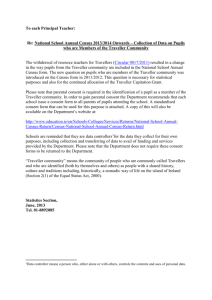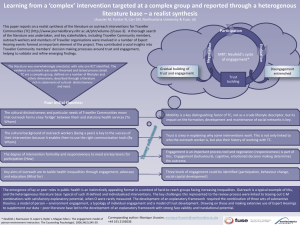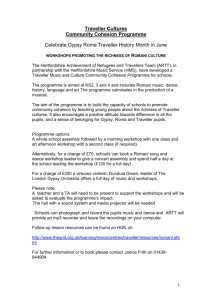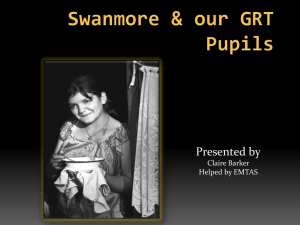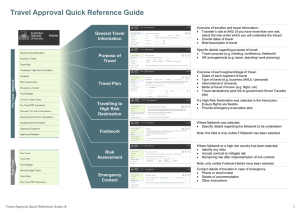Traveller Children and School Admissions and Attendance
advertisement
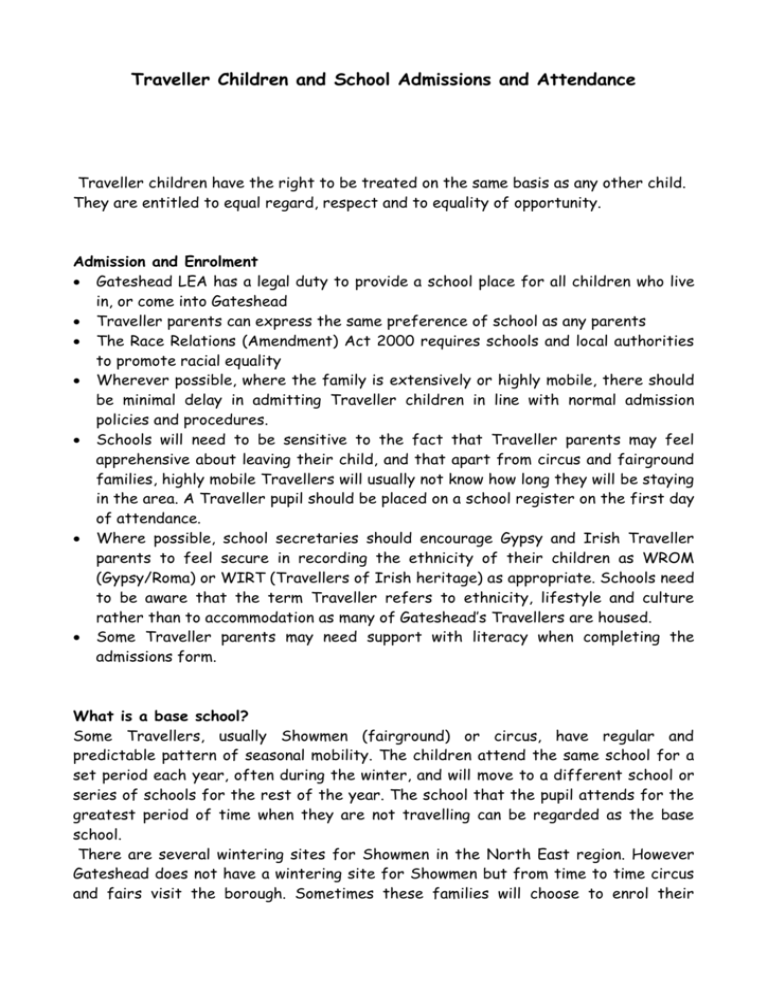
Traveller Children and School Admissions and Attendance Traveller children have the right to be treated on the same basis as any other child. They are entitled to equal regard, respect and to equality of opportunity. Admission and Enrolment Gateshead LEA has a legal duty to provide a school place for all children who live in, or come into Gateshead Traveller parents can express the same preference of school as any parents The Race Relations (Amendment) Act 2000 requires schools and local authorities to promote racial equality Wherever possible, where the family is extensively or highly mobile, there should be minimal delay in admitting Traveller children in line with normal admission policies and procedures. Schools will need to be sensitive to the fact that Traveller parents may feel apprehensive about leaving their child, and that apart from circus and fairground families, highly mobile Travellers will usually not know how long they will be staying in the area. A Traveller pupil should be placed on a school register on the first day of attendance. Where possible, school secretaries should encourage Gypsy and Irish Traveller parents to feel secure in recording the ethnicity of their children as WROM (Gypsy/Roma) or WIRT (Travellers of Irish heritage) as appropriate. Schools need to be aware that the term Traveller refers to ethnicity, lifestyle and culture rather than to accommodation as many of Gateshead’s Travellers are housed. Some Traveller parents may need support with literacy when completing the admissions form. What is a base school? Some Travellers, usually Showmen (fairground) or circus, have regular and predictable pattern of seasonal mobility. The children attend the same school for a set period each year, often during the winter, and will move to a different school or series of schools for the rest of the year. The school that the pupil attends for the greatest period of time when they are not travelling can be regarded as the base school. There are several wintering sites for Showmen in the North East region. However Gateshead does not have a wintering site for Showmen but from time to time circus and fairs visit the borough. Sometimes these families will choose to enrol their children in a local school while they are in the area. These pupils will be dual registered with their wintering school. There are also groups of highly mobile Gypsy and Irish Traveller families who may have base schools elsewhere. Dual Registration To protect Traveller children from having a fragmented educational pattern, the pupil registration regulations allow Traveller children to be dual registered. The school they normally attend while not travelling is regarded as the base school, and in most cases is the school that receives the funding. Traveller children travelling away from their base school may register at other schools on a temporary basis. When a Traveller family arrives in an area, it is important to ascertain whether there is a base school, and if so to inform the base school that the Traveller pupil is dual registered. Base school should keep the Traveller pupils on roll so that their place within that school community is secure. In such cases, the base school should record the Traveller pupil’s absence while travelling as authorised, and as an authorised educational activity once the pupil is enrolled at another school. Where a pupil may be registered simultaneously at two schools, only one school is eligible to receive the funding. This is normally the base school. PLASC Traveller children should be included by the school that they are attending on the census day. If there is a base school, the base school should include all Traveller children known to be returning, regardless of whether or not they are attending on the census day. If a child is at school on the census day and is also registered at a base school then they should be recorded on both schools. Register Coding The absence code T on most registers denotes Traveller child travelling: this is a code of absence and not one of ethnicity. When Traveller children are registered pupils at a school and are known to be present either at a site, official or unofficial or in a house and are not attending school, the absence should be investigated in the same way as that for any other pupil. If a school is satisfied that a family is genuinely travelling and the family has indicated they have every intention to return (this can be verified with the TES) the code mark T can be used. If the absence is for any other reason, whether unknown, unauthorised, medical etc, then these are the codes that should be registered as for any other child. Some leeway can be offered with regard to absence for families who have moved from, or been evicted from a Traveller site. Where a family indicates that they will be returning at a later date, the school should mark the register as T for travelling. If the family does not return within 40 sessions of the indicated date, the pupils name should be taken off roll retrospectively 4 weeks after the date of the last attendance in line with The Education (Pupil Registration) regulations 1997 and the TES informed. Attendance The special position of Traveller families is recognised within the Education Act 1996 which protects Traveller parents from conviction if the parent can demonstrate that: o He is engaged in a trade or business of such nature as requires him to travel from place to place and o The child has attended a school as a registered pupil as regularly as the nature of the trade or business permitted o When the child has attained the age of 6 years, he has made at least 200 attendances (i.e. 200 sessions or half days) during the preceding twelve months The purpose is to protect Traveller parents from unreasonable prosecution for the non-attendance of their children at school. It does not mean that part-time education for Traveller children is legally acceptable, nor does it relieve parents of their legal duties to ensure that their children are receiving suitable education while not at school. ‘In general, the aim should always be to ensure that Traveller children, in common with all other children, attend school as regularly as possible’. The responsibility for improving attendance is a multi-agency one, working collaboratively to improve attendance in Gateshead schools. With this in mind it is important for schools to recognise and log correctly the genuine reasons for Traveller absence. Travelling families are no more exempt from the need to provide legitimate reasons for absence than any other family. Records of attendance/absence should be verified and documented accordingly. In general, the aim should be to ensure that Traveller children, in common with all other children attend school as regularly and as frequently as possible. – 200 attendances should not be regarded as the norm or the maximum. A difficult balance has to be struck between, a need for action in individual cases in the interests of the child and adopting a sensitive and sympathetic approach which recognises lifestyle and cultural traditions of the family concerned. The Traveller Education Service in EMTAS with Education Welfare monitors Traveller pupils’ attendance through requesting data on a termly basis from the schools that Traveller pupils are known to attend. Families with identified poor attendance are encouraged to raise the pupils’ attendance. The national attendance average for Traveller pupils is currently 75%. If the school has concerns regarding a Traveller pupil’s attendance, in the first instance, for highly mobile families living on sites, the Traveller team in (EMTAS) may be able to clarify the reason for absence, but in general absence should be brought to the attention of the Education Welfare Service Access & Inclusion in the same way as for any other pupil. The TES works closely with Education Welfare to ensure visits are made to families that provide a sensitive approach, which recognises the lifestyle and cultural traditions of Traveller families while encouraging an improvement in attendance. Where there has been uncertainty, it is advisable for the school to inform the TES immediately and keep the pupil on roll until the TES has had an opportunity to make enquiries and to clarify the situation. If a Traveller family remains in the area but states that the child is staying in another part of the country, the TES or Education Welfare officer should ask the family for an address and point of contact so that the local TES can be informed and a local EWO/ESW can assure school attendance.

